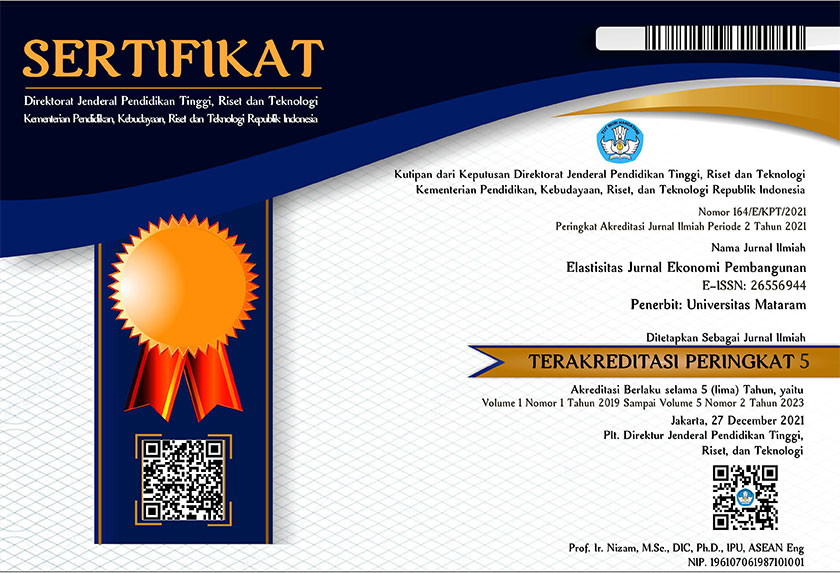PERTUMBUHAN EKONOMI, INVESTASI ASING LANGSUNG DAN EMISI KARBON DI INDONESIA PERIODE 1990-2022
Economic Growth, Foreign Direct Investment, and Carbon Emission in Indonesia During 1990-2022
Keywords:
Carbon Emission, FDI, GNI, Kuznets CurveAbstract
Climate change caused by the increasing of carbon emission needs to get serious attention from the society and the policy maker. One of the key factors that makes the carbon emission advance almost uncontrollably is the economic activities such as industrial action. This paper examines the relationship between economic growth, investment, and carbon emissions in Indonesia over the period 1990-2022. Time series data are used to investigate this correlation. The result indicate there is a positive relationship between GNI and carbon emissions, which confirm the environmental Kuznets Curve. As for the Foreign Direct Investment, the result indicate that estimated coefficient is negative.
References
Hansen, J., Kharecha, P., Sato, M., Masson-Delmotte, V., Ackerman, F., Beerling, D. J., Hearty, P. J., Hoegh-Guldberg, O., Hsu, S. L., Parmesan, C., Rockstrom, J., Rohling, E. J., Sachs, J., Smith, P., Steffen, K., Van Susteren, L., Von Schuckmann, K., & Zachos, J. C. (2013). Assessing “dangerous climate changeâ€: Required reduction of carbon emissions to protect young people, future generations and nature. PLoS ONE, 8(12). https://doi.org/10.1371/journal.pone.0081648
Isnowati, S. (2007). Pengujian Hipotesis Kuznets di Wilayah Pembangunan Jawa Tengah. Jurnal Bisnis dan Ekonomi Vol. 14 No. 1, Maret , 1-14.
Kristianto, A. H. (2020). Sustainable Development Goals (SDGs) dalam Konsep Green Economy untuk Pertumbuhan Ekonomi Berkualitas Berbasis Ekologi. Journal Business Economics and Enterpreneurship, 27-38.
Ozturk, I. (2007). FOREIGN DIRECT INVESTMENT-GROWTH NEXUS: A REVIEW OF THE RECENT LITERATURE. In International Journal of Applied Econometrics and Quantitative Studies (Vol. 4, Issue 2).
Pant, K. P. (2009). EFFECTS OF AGRICULTURE ON CLIMATE CHANGE: A CROSS COUNTRY STUDY OF FACTORS AFFECTING CARBON EMISSIONS. In The Journal of Agriculture and Environment (Vol. 10).
Pata, U. K. (2021). Renewable and non-renewable energy consumption, economic complexity, CO2 emissions, and ecological footprint in the USA: testing the EKC hypothesis with a structural break. Environmental Science and Pollution Research, 28(1), 846–861. https://doi.org/10.1007/s11356-020-10446-3
Prinadi, A. N., Sarungu, J. J., Suryantoro, A., & Gravitiani, E. (2022). Dampak Pertumbuhan Ekonomi, Nilai Tambah Industri, dan Populasi Terhadap Emisi Karbon Dioksida di Kawasan ASEAN. Prosiding Nasional (pp. 6-15). Universitas Abdurrachman Saleh Situbundo.
Rany, A. P., Farhani, S. A., Nurina, V. R., & Pimada, L. M. (2020). TANTANGAN INDONESIA DALAM MEWUJUDKAN PERTUMBUHAN EKONOMI YANG KUAT DAN PEMBANGUNAN EKONOMI BERKELANJUTAN MELALUI INDONESIA GREEN GROWTH PROGRAM OLEH BAPPENAS. JIEP, 20(1).
Yuping, L., Ramzan, M., Xincheng, L., Murshed, M., Awosusi, A. A., BAH, S. I., & Adebayo, T. S. (2021). Determinants of carbon emissions in Argentina: The roles of renewable energy consumption and globalization. Energy Reports, 7, 4747–4760. https://doi.org/10.1016/J.EGYR.2021.07.065






